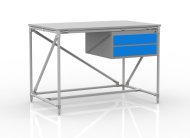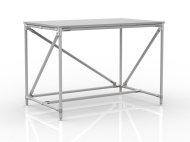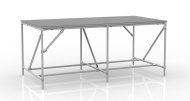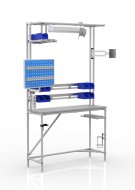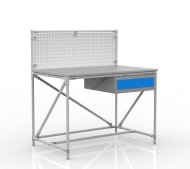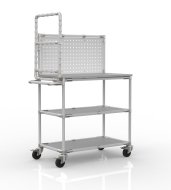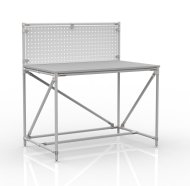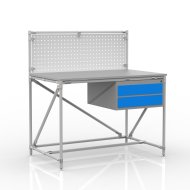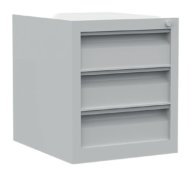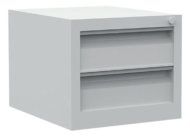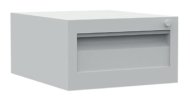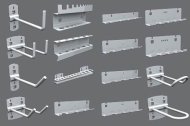Code: 24040531
Workshop table with container with two drawers 24040531 (3 models)
300.00 Eur without VAT
(363.00 Eur with VAT)
Workshop table made of tubular modular system with 18 mm thick laminate worktop, table container with two drawers and four adjustable legs. Load capacity with a uniform load of 100 kg. Dimensions 850 x 1200 x 750 mm.
Code: 24040535
Pipe system workshop table 24040535 (3 models)
156.16 Eur without VAT
(188.95 Eur with VAT)
Workshop table from a tubular modular system with an 18 mm thick laminate worktop and four adjustable legs. The table provides enough space for completing and packing orders, etc. Load capacity with a uniform load of 100 kg. Dimensions 850 x 1200 x 750 mm.
Code: 22042004
Workbench 22042004
381.14 Eur without VAT
(461.18 Eur with VAT)
Work table made of tubular modular system with DTDL worktop 18 mm thick and with anti-slip layer 3 mm thick. The table provides enough space for complementing and packing orders, etc. Load capacity with an even load of 200 kg. Dimensions 850 x 2000 x 1000 mm.
Code: 22042207
Assembly table 22042207
Price on request
Assembly workstation made of tubular modular for easy assembly with a load capacity of 100 kg. Work surface made of 18 mm thick DTDL board with the option of replacing it with a 40 mm thick beech joint. Workplace equipment is variable and at the customer's request. Dimensions 2100 x 1203 x 403 mm.
Code: 240408313
Workshop table from pipe system with perforated panel 240408313 (3 models)
370.59 Eur without VAT
(448.41 Eur with VAT)
Workshop table with perforated panel from the tubular modular system. The table includes a laminate worktop, a table container with one drawer, a perforated panel and four adjustable legs. Load capacity with a uniform load of 100 kg. Dimensions 1282 x 1200 x 750 mm.
Code: 24091230
Table with folding mechanism 24091230
423.92 Eur without VAT
(512.94 Eur with VAT)
Table with folding mechanism made from a tubular modular system. The table includes a folding structure for securing trash bags, an 18 mm thick laminated worktop, two shelves with 10 mm thick Akyboard, four swivel wheels with brakes, each with a diameter of 100 mm, and a perforated panel for hanging tools or storage bins. The shelf load capacity is 50 kg, the worktop load capacity is 100 kg, and the total load capacity is 200 kg. Dimensions: 1335 x 900 x 498 mm.
Code: 240408312
Workshop table from pipe system with perforated panel 240408312 (3 models)
230.94 Eur without VAT
(279.44 Eur with VAT)
Workshop table with perforated panel from the tubular modular system. The table includes a laminate worktop, a perforated panel with dimensions of 1117 x 393 mm and four adjustable legs. Load capacity with a uniform load of 100 kg. Dimensions 1282 x 1200 x 750 mm.
Code: 240408314
Workshop table from pipe system with perforated panel 240408314 (3 models)
409.18 Eur without VAT
(495.11 Eur with VAT)
Workshop table with perforated panel from the tubular modular system. The table includes a laminate worktop, a table container with two drawers, a perforated panel and four adjustable legs. Load capacity with a uniform load of 100 kg. Dimensions 1282 x 1200 x 750 mm.
Code: HDK-D03
Table container HDK-D03
71.71 Eur without VAT
(86.77 Eur with VAT)
Hanging container with three drawers for a work table, height 380, width 330, depth 400 mm. 3x socket, color ESD gray RAL 7035.
Code: HDK-D02
Table container HDK-D02
54.54 Eur without VAT
(65.99 Eur with VAT)
Hanging container with two drawers for a work table, height 280, width 330, depth 400 mm. 2x socket, color ESD gray RAL 7035.
Code: HDK-D01
Table container HDK-D01
38.18 Eur without VAT
(46.20 Eur with VAT)
Hanging container with a drawer for a work table, height 180, width 330, depth 400 mm. 1x socket, color ESD gray RAL 7035.
Code: QDN_50_01
Bracket set for Q-system QDN 5001
74.50 Eur without VAT
(90.15 Eur with VAT)
Set of brackets for the Q-system QDN 5001.
Code: LDTD_1230_U1188MP
Shelf/work ESD board laminated on both sides
59.61 Eur without VAT
(72.13 Eur with VAT)
ESD chipboard laminated on both sides, light gray. Chipboard dissipating electrostatic charge according to EN 61340-5-1 designed for dry environments.
Code: LDTD_1530_U1188MP
Shelf/work ESD board laminated on both sides
81.66 Eur without VAT
(98.81 Eur with VAT)
ESD chipboard laminated on both sides, light gray. Chipboard dissipating electrostatic charge according to EN 61340-5-1 designed for dry environments.
Code: LDTD_1830_U1188MP
Shelf/work ESD board laminated on both sides
93.11 Eur without VAT
(112.66 Eur with VAT)
ESD chipboard laminated on both sides, light gray. Chipboard dissipating electrostatic charge according to EN 61340-5-1 designed for dry environments.
Code: LDTD_1290_U1188MP
Work ESD board laminated on both sides
160.95 Eur without VAT
(194.75 Eur with VAT)
ESD chipboard laminated on both sides, light gray. Chipboard dissipating electrostatic charge according to EN 61340-5-1 designed for dry environments.
Code: LDTD_1590_U1188MP
Work ESD board laminated on both sides
213.72 Eur without VAT
(258.60 Eur with VAT)
ESD chipboard laminated on both sides, light gray. Chipboard dissipating electrostatic charge according to EN 61340-5-1 designed for dry environments.
Code: LDTD_1890_U1188MP
Work ESD board laminated on both sides
214.23 Eur without VAT
(259.22 Eur with VAT)
ESD chipboard laminated on both sides, light gray. Chipboard dissipating electrostatic charge according to EN 61340-5-1 designed for dry environments.
Code: LDTD_1270_U1188MP
Work ESD board laminated on both sides
129.22 Eur without VAT
(156.36 Eur with VAT)
ESD chipboard laminated on both sides, light gray. Chipboard dissipating electrostatic charge according to EN 61340-5-1 designed for dry environments.
Code: LDTD_1570_U1188MP
Work ESD board laminated on both sides
213.72 Eur without VAT
(258.60 Eur with VAT)
ESD chipboard laminated on both sides, light gray. Chipboard dissipating electrostatic charge according to EN 61340-5-1 designed for dry environments.
Code: LDTD_1870_U1188MP
Work ESD board laminated on both sides
214.23 Eur without VAT
(259.22 Eur with VAT)
ESD chipboard laminated on both sides, light gray. Chipboard dissipating electrostatic charge according to EN 61340-5-1 designed for dry environments.
What is lean manufacturing?
Lean manufacturing, also known as lean production, is a comprehensive system through which a company strives to achieve maximum efficiency and minimize waste in all areas of its operations. The principles of lean, often referred to simply as "lean," form the foundation of this strategy and include optimizing processes and eliminating unnecessary operations.
One of the key elements of lean manufacturing is the 5S method, which helps companies achieve better organization of the work environment. By applying the principles of 5S (Seiri, Seiton, Seiso, Seiketsu, Shitsuke), it is possible to use the workspace more efficiently and more easily identify and solve problems. Other significant methods within lean manufacturing include Lean Six Sigma, which focuses on identifying and eliminating the causes of errors and defects, and the Kanban method, which is used to visualize work processes and monitor the flow of materials, as well as the SMED method.
Although the concept of lean manufacturing has its origins in the production system established in Henry Ford's factories, it is most commonly associated with the Japanese company Toyota.
Optimization of material flow through a flexible pipe system
The fundamental aim of lean manufacturing is to produce more with lower inventory, fewer workers, and using less space, all of which are associated with reduced costs. This is achieved through the use of assemblies, workstations, or Kanban racks, which provide comprehensive or partial lean solutions. These include shelving assemblies and work furniture made, for example, from aluminum profiles or pipe modular systems. An important component of these assemblies is roller tracks, which are used for moving parts, containers, packages, etc. Their use reduces the physical strain on workers and ensures faster, uncomplicated, and stress-free work.
The goal of using assemblies is to achieve stable, flexible, and standardized production through optimization and improved material flow. This goes hand in hand with reducing operating costs and increasing work productivity. Moreover, existing assemblies can be modified at any time and in any way without significant financial costs.
You can introduce lean manufacturing gradually
Contrary to the myths surrounding lean manufacturing, there's no need to implement radical changes throughout the entire company all at once. Yes, lean manufacturing can be applied across the board, but it's also possible to consider where it makes sense to start within the company. Lean management serves as a strategic approach to gradually introducing lean manufacturing, focusing on continuous process improvement and engaging employees at all levels of the organization. Thanks to the modular nature of the construction system, optimization of workflows can occur gradually. So, if you're considering implementing lean manufacturing principles in your company, start today. Even a small change can bring significant benefits to your company, which is invaluable in today's world. Our team offers comprehensive services – from solution design and visualization to on-site assembly. Contact us or visit our showroom directly.
